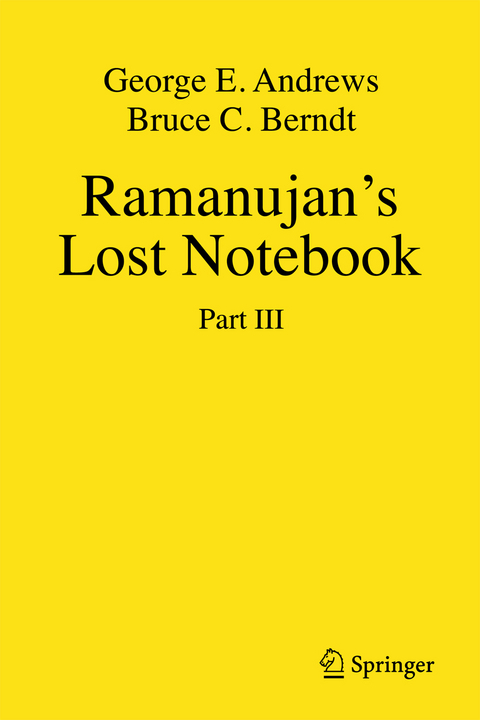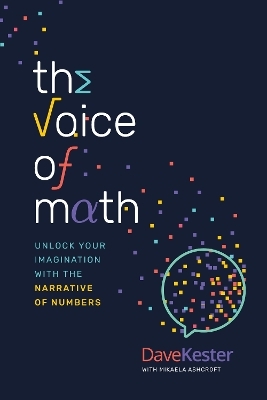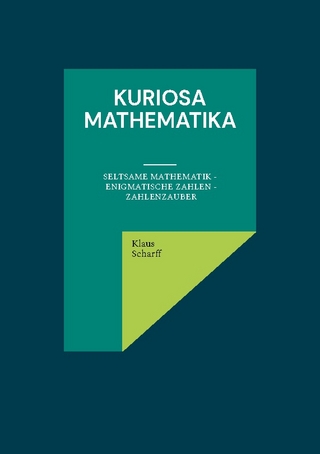
Ramanujan's Lost Notebook
Part III
Seiten
2014
|
2012 ed.
Springer-Verlag New York Inc.
978-1-4899-9497-4 (ISBN)
Springer-Verlag New York Inc.
978-1-4899-9497-4 (ISBN)
Its discovery has frequently been deemed the mathematical equivalent of finding Beethoven's tenth symphony.
This volume is the third of five volumes that the authors plan to write on Ramanujan’s lost notebook and other manuscripts and fragments found in The Lost Notebook and Other Unpublished Papers, published by Narosa in 1988.
In the spring of 1976, George Andrews of Pennsylvania State University visited the library at Trinity College, Cambridge to examine the papers of the late G.N. Watson. Among these papers, Andrews discovered a sheaf of 138 pages in the handwriting of Srinivasa Ramanujan. This manuscript was soon designated, "Ramanujan's lost notebook." Its discovery has frequently been deemed the mathematical equivalent of finding Beethoven's tenth symphony.
This volume is the third of five volumes that the authors plan to write on Ramanujan’s lost notebook and other manuscripts and fragments found in The Lost Notebook and Other Unpublished Papers, published by Narosa in 1988. The ordinary partition function p(n) is the focus of this third volume. In particular, ranks, cranks, and congruences for p(n) are in the spotlight. Other topics include the Ramanujan tau-function, the Rogers–Ramanujan functions, highly composite numbers, and sums of powers of theta functions.
Reviewfrom the second volume:
"Fans of Ramanujan's mathematics are sure to be delighted by this book. While some of the content is taken directly from published papers, most chapters contain new material and some previously published proofs have been improved. Many entries are just begging for further study and will undoubtedly be inspiring research for decades to come. The next installment in this series is eagerly awaited."
- MathSciNet
Review from the first volume:
"Andrews a
nd Berndt are to be congratulated on the job they are doing. This is the first step...on the way to an understanding of the work of the genius Ramanujan. It should act as an inspiration to future generations of mathematicians to tackle a job that will never be complete."
- Gazette of the Australian Mathematical Society
This volume is the third of five volumes that the authors plan to write on Ramanujan’s lost notebook and other manuscripts and fragments found in The Lost Notebook and Other Unpublished Papers, published by Narosa in 1988.
In the spring of 1976, George Andrews of Pennsylvania State University visited the library at Trinity College, Cambridge to examine the papers of the late G.N. Watson. Among these papers, Andrews discovered a sheaf of 138 pages in the handwriting of Srinivasa Ramanujan. This manuscript was soon designated, "Ramanujan's lost notebook." Its discovery has frequently been deemed the mathematical equivalent of finding Beethoven's tenth symphony.
This volume is the third of five volumes that the authors plan to write on Ramanujan’s lost notebook and other manuscripts and fragments found in The Lost Notebook and Other Unpublished Papers, published by Narosa in 1988. The ordinary partition function p(n) is the focus of this third volume. In particular, ranks, cranks, and congruences for p(n) are in the spotlight. Other topics include the Ramanujan tau-function, the Rogers–Ramanujan functions, highly composite numbers, and sums of powers of theta functions.
Reviewfrom the second volume:
"Fans of Ramanujan's mathematics are sure to be delighted by this book. While some of the content is taken directly from published papers, most chapters contain new material and some previously published proofs have been improved. Many entries are just begging for further study and will undoubtedly be inspiring research for decades to come. The next installment in this series is eagerly awaited."
- MathSciNet
Review from the first volume:
"Andrews a
nd Berndt are to be congratulated on the job they are doing. This is the first step...on the way to an understanding of the work of the genius Ramanujan. It should act as an inspiration to future generations of mathematicians to tackle a job that will never be complete."
- Gazette of the Australian Mathematical Society
George E. Andrews is currently a professor of mathematics at Pennsylvania State University. Bruce C. Berndt is currently a professor of mathematics at the University of Illinois.
Preface.- Introduction.- 1. Ranks and Cranks, Part I.- 2. Ranks and Cranks, Part II.- 3. Ranks and Cranks, Part III.- 4. Ramanujan's Unpublished Manuscript on the Partition and Tau Functions.- 5. Theorems about the Partition Function on Pages 189 and 182.- 6. Congruences for Generalized Tau Functions on Page 178.- 7. Ramanujan's Forty Identities for the Rogers-Ramanujan Functions.- 8. Circular Summation.- 9. Highly Composite Numbers.- Scratch Work.- Location Guide.- Provenance.- References.
| Zusatzinfo | XII, 436 p. |
|---|---|
| Verlagsort | New York |
| Sprache | englisch |
| Maße | 155 x 235 mm |
| Themenwelt | Mathematik / Informatik ► Mathematik ► Arithmetik / Zahlentheorie |
| Mathematik / Informatik ► Mathematik ► Wahrscheinlichkeit / Kombinatorik | |
| Schlagworte | highly composite numbers • ordinary partition function • Ramanujan tau-Function • Rogers–Ramanujan functions • theta functions |
| ISBN-10 | 1-4899-9497-1 / 1489994971 |
| ISBN-13 | 978-1-4899-9497-4 / 9781489994974 |
| Zustand | Neuware |
| Haben Sie eine Frage zum Produkt? |
Mehr entdecken
aus dem Bereich
aus dem Bereich
Sieben ausgewählte Themenstellungen
Buch | Softcover (2024)
De Gruyter Oldenbourg (Verlag)
64,95 €
unlock your imagination with the narrative of numbers
Buch | Softcover (2024)
Advantage Media Group (Verlag)
19,90 €
Seltsame Mathematik - Enigmatische Zahlen - Zahlenzauber
Buch | Softcover (2024)
BoD – Books on Demand (Verlag)
20,00 €


